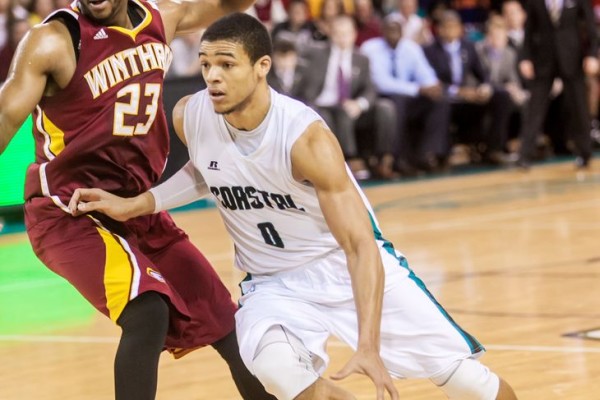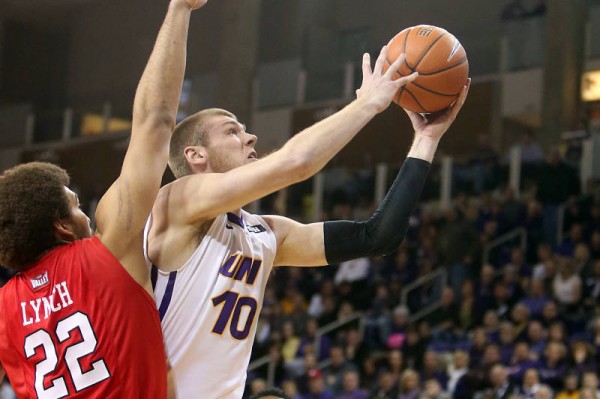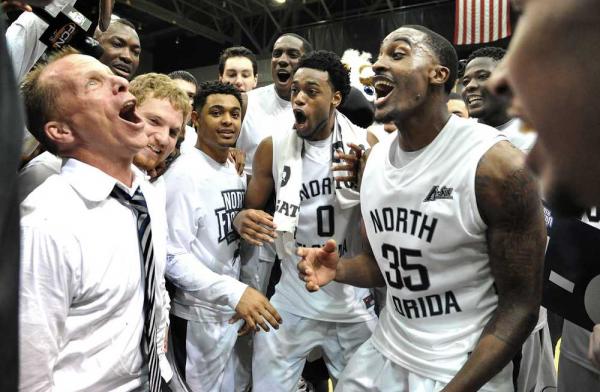Bracket Prep: Coastal Carolina, Northern Iowa & North Florida
Posted by Tommy Lemoine on March 9th, 2015As we move through Championship Week, we’ll continue to bring you short reviews of each of the automatic qualifiers to help you fill out your bracket next week. Here’s what you need to know about the most recent bid winners:
Coastal Carolina
- Big South Champion (22-10, 11-5)
- RPI/Pomeroy/Sagarin = #144/#147/#151
- Adjusted Scoring Margin = +2.4
- Likely NCAA Seed: #16
Strength: Coastal does not have great size but it does have an excellent guard quartet which accounts for two-thirds of the team’s scoring. Josh Cameron, Warren Gillis, Elijah Wilson and Shivaughn Wiggins – a Mount St. Mary’s transfer – each averages between 10.3 and 12.9 points per game and is a capable outside shooter. Their quickness and dribble-penetration abilities create kickouts and plenty of free throw opportunities, where the Chanticleers shoot a healthy 70.3 percent on the season. Despite ranking 301st nationally in effective height, the Big South champs are also a top-50 offensive and defensive rebounding team.
Weakness: Though the Chanticleers are fairly well-balanced and don’t have many glaring weaknesses, the vast majority of their losses came against opponents with an average possession length of 18 seconds of fewer – teams that like to get the ball and go. Squads that are able to get up the court before Coastal can set up its half-court defense – which often features numerous zone looks – seem to have the most success against Cliff Ellis’ bunch. The Chanticleers also ranked dead last in the conference (and 292nd nationally) in turnover percentage, which is only a bad thing as far as transition defense goes.
Key Player: Badou Diagne (9.5 PPG, 7.5 RPG). It’s difficult to pinpoint one ‘key player’ on a roster that features such balance, but – if there is one – Diagne might be that guy. Not only does the junior lead the team in rebounding and serve as its strongest inside presence (alongside 6’7” Tristian Curtis), but his ability to step out and drain shots from the perimeter (42.6% 3FG) draws interior defenders and unclogs the lane for guards. He will be crucial on both ends of the floor against an undoubtedly larger opponent.
Outlook: As a #16-seed last season, Coastal led Virginia by five points at halftime in the opening round of the NCAA Tournament. Most of that roster (which ultimately fell to the Cavaliers) is back, including Gillis and Diagne, who accounted for 27 of the team’s 59 points. With tough, experienced guards and a veteran head coach who has been around the block a few times – Ellis has taken four different programs to the NCAA Tournament – look for the Chanticleers to come out swinging again this year. They can hang around for a half or more, depending on the match-up.
Northern Iowa
- Missouri Valley Champion (30-3, 16-2)
- RPI/Pomeroy/Sagarin = #14/#11/#24
- Adjusted Scoring Margin = +11.5
- Likely NCAA Seed: #4
Strength: Strength? Try strengths. Many of them. The Panthers are exceptionally well-balanced and remarkably slow, ranking among the 20-most efficient offensive and defensive teams in the country and taking their sweet time – 21.2 seconds per possession – when they have the ball. That methodical approach is mostly the symptom of trying to find (and often locating) the best possible shot. Northern Iowa uses crisp ball movement and high ball screens to space the floor and free open outside shooters, who generally do not miss; the Panthers boast the eighth-best effective field goal percentage in college hoops (56.2% eFG). When they aren’t draining shots from the outside, the Missouri Valley champs utilize the quickness of guards Deon Mitchell and Wes Washpun to attack the rim and draw contact or open up easy looks for teammates. Defensively, head coach Ben Jacobson employs a version of the pack-line that makes getting into the paint and earning trips to the free throw line very difficult. Even when teams do work the ball underneath, they struggle to get past Seth Tuttle who – in addition to his offensive prowess – has become a rock-solid post defender.
Weakness: Conversely (again, look at that 30-3 record), Northern Iowa does not have many weaknesses. But there are times when their strengths aren’t as strong as they should be, most notably on offense. At Wichita State on February 28 and in the first half against Illinois State on Sunday, the Panthers looked stagnant at times – not moving the ball particularly well and failing to attack the basket – which became an especially serious problem once the shots stopped falling. They were able to respond and bounce back against the Redbirds, but another lethargic half against a top-notch, NCAA Tournament-caliber opponent? That could spell trouble.
Key Player: Seth Tuttle (15.3 PPG, 6.7 RPG). Tuttle is simply one of the best forwards in the game, ranking among the top-100 players nationally in free throw rate, assist rate, defensive rebounding percentage and effective field goal percentage (64.8% eFG). Northern Iowa often runs its offense through the senior, allowing him to go to work on blocks or draw extra attention so he can generate looks for teammates. He can shoot from all over the court (18-of-42 3FG), defends well and plays well in big games (29 points against Wichita State on January 31).
Outlook: After trailing Illinois State by as many as 18 points in the first half on Sunday, Northern Iowa flexed its muscle against an inferior opponent and won the MVC championship going away. That should tell you all you need to know about the talent and resolve of this team. The Panthers will be as legitimate as any other #4 seed next week, capable of going deep into the second weekend and possibly beyond.
North Florida
- Atlantic Sun Champion (23-11, 12-2)
- RPI/Pomeroy/Sagarin = #170/#125/#143
- Adjusted Scoring Margin = +2.5
- Likely NCAA Seed: #16
Strength: It’s all about the three-point shot for North Florida, which works out pretty well since it shoots nearly 40 percent from that distance. Almost every player on the roster (outside of 6’11” big man Romello Banks) is proficient from behind the arc, as open looks are often generated by point guard Dallas Moore (16.0 PPG) and wing Jalen Nesbitt’s ability to penetrate. Beau Beech (38% 3FG) and Trent Mackey (45% 3FG) are two of the biggest beneficiaries, each high-volume, high-accuracy shooters capable of catching fire. When the Ospreys are knocking down shots – like they did in their December upset of Purdue (10-of-22 3FG) – they are a tough out. Triples account for 42 percent of the team’s overall field goal attempts, so making them with some degree of consistency is its best and only chance.
Weakness: While the Ospreys do a good job of defending the perimeter and running teams off the three point line (32.5% 3FG defense), they also struggle on the interior, enabling opponents to score nearly 60 percent of their points from inside the arc. In a 16-point loss at Florida State in mid-December, North Florida surrendered 29 made two-point field goals on 67 percent shooting against the massive Seminoles. Likewise, Matthew Driscoll’s bunch is subpar on both the offensive (28.9% OReb) and defensive (32% DReb) glass and lacks overall depth, ranking 320th nationally in bench minutes.
Key player: Dallas Moore (16 PPG, 3.7 APG). Moore is the catalyst for North Florida’s three-point happy attack, and when he plays well, the team plays well. The 6’1” sophomore’s leadership, ability to penetrate and propensity to hit big shots – like the dagger three he hit against the Boilermakers with 54 seconds left – are crucial for the Ospreys moving forward.
Outlook: Can North Florida become the third-straight Atlantic Sun representative to pull off an NCAA Tournament stunner? Florida Gulf Coast dunked its way to the Sweet Sixteen in 2013 and Mercer upended Duke last year, but for the Ospreys to do it, they will probably have to overcome decades of history; no #1-seed has ever fallen to a #16-seed – North Florida’s probable landing spot. Still, if Driscoll’s club gets hot – like, really hot – from behind the arc… you never know.












































